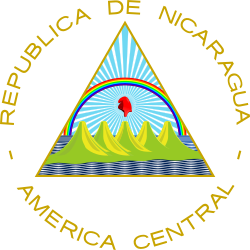This article needs additional citations for verification .(June 2023) |
 |
|---|
This article lists political parties in Nicaragua.
This article needs additional citations for verification .(June 2023) |
 |
|---|
This article lists political parties in Nicaragua.
Historically, Nicaragua had a two-party system, with varying two dominant political parties. The 2006 general election could have marked the end of the bipartite scheme, as the anti-Sandinista forces split into two major political alliances: the Nicaraguan Liberal Alliance (ALN) and the Constitutionalist Liberal Party (PLC). [1]
Three parties and alliances currently hold seats in the National Assembly:
| Party | Abbr. | Ideology | Founded | Deputies | PARLACEN | ||
|---|---|---|---|---|---|---|---|
| Sandinista National Liberation Front Frente Sandinista de Liberación Nacional | FSLN | Sandinismo | 1961 | 75 / 92 | 15 / 20 | ||
| Constitutionalist Liberal Party Partido Liberal Constitucionalista | PLC | Conservatism [2] | 1968 | 9 / 92 | 2 / 20 | ||
| Independent Liberal Party Partido Liberal Independiente | PLI | Liberalism | 1944 | 2 / 92 | 1 / 20 | ||
| Nicaraguan Liberal Alliance Alianza Liberal Nicaragüense | ALN | Conservative liberalism | 2005 | 1 / 92 | 1 / 20 | ||
| Alliance for the Republic Alianza por la República | APRE | Liberal conservativism | 2004 | 1 / 92 | 1 / 20 | ||
a = active
a = active
a = active
A couple of months after Pirates of the Caribbean II had its Managua premiere, Frente Sandinista de Liberación Nacional (Sandinista National Liberation Front, FSLN) won the Nicaraguan national elections after 16 years in opposition, replacing the neoliberal/conservative government of Partido Liberal Constitucionalista (Liberal Constitutionalist Party, PLC).